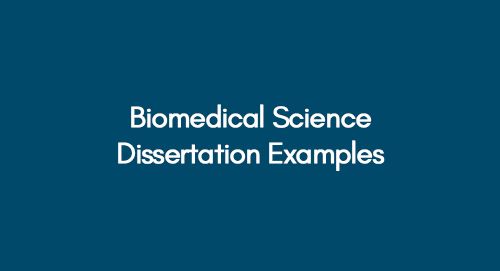
How to Write a Methodology Dissertation? Tips and Examples
February 7, 2023
History Dissertation Examples
February 8, 2023Writing a dissertation in a biomedical field is an enormous achievement but also a hectic task needing a lot of research and field knowledge.
In the biomedical sciences, dissertations are expected to demonstrate original research and analysis to contribute new knowledge to the field.
Biomedical science is an interdisciplinary field that combines elements from the fields of biology, chemistry, mathematics, computer science, and engineering to understand the biological processes underlying human health and disease.
This field has played an important role in research advancements over the years. This article will take a closer look at what biomedical science entails and how it has helped improve our understanding of medical advancement.
Example: 1 Statistical Analysis of Socio-Physical Influence on Human Weight
We have shared biomedical science dissertation examples for you to get inspiration on how to write your dissertation, along with prior research to get insight.
Role of the Biomedical Science in Society
The main goal of biomedical science is better to understand the scientific basis of human health and disease. It includes investigating the body's response to different diseases and treatments and identifying new methods for diagnosing and mitigating diseases.
Researchers use techniques such as cell culture, biochemistry, molecular biology, immunology, genetics, bioinformatics, and systems biology to do this.
In addition to these techniques, biomedical scientists also employ advanced technologies such as imaging techniques (CT scans), microscopy (optical or electron), and spectroscopy (FTIR or Raman) for detailed analysis of cells or tissues.
Biomedical science can be used in many areas, including drug discovery, regenerative medicine (including stem cell therapies), gene therapy/editing/therapeutics development, tissue engineering/organ printing/bioartificial organs development etc.
For example, advances in gene sequencing technology have allowed us to identify genetic predispositions for certain diseases, which can then be modulated using drugs or gene therapy approaches.
Similarly, with the advance in imaging technology, we can now detect cancerous cells long before they become malignant, giving rise to an early detection mechanism that significantly increases patient survival. These breakthroughs would not have been possible without support from Biomedical Science research.
Data Collection Methodology for Biomedical Dissertation
The choice of methods will depend on the research question, available resources, ethical considerations, and data collection type. It is important to carefully consider the strengths and limitations of each method and choose the one that best suits the research objectives.
If you want to know how your research questions should be structured and designed, click the link below.
- Surveys and Questionnaires: This involves collecting data through self-administered or interviewer-administered questionnaires.
- Experiments: Involves manipulating variables to observe the effect on a dependent variable, either in a laboratory or a real-world setting.
- Observational Studies: This involves observing and collecting data on a specific phenomenon without manipulation, such as case-control studies, cross-sectional studies, or cohort studies.
- Secondary Data Analysis: Analyzing current data sources, such as electronic health records, databases, or published research, is required.
- Qualitative Methods: This involves collecting data through unstructured or semi-structured interviews, focus groups, or content analysis. You can also check out the biomedical science dissertation example to have an idea of how to manage your qualitative data in a dissertation carefully.
Steps to Follow while Writing a Biomedical Science Dissertation
1. Choose a Unique Topic
The first step to writing a biomedical science dissertation is choosing a topic you are passionate about. It will make the process of writing your dissertation much more enjoyable and will also help to ensure that your finished product is of high quality.
2. Do Your Research
Doing your research is extremely important after selecting a topic. That includes conducting experiments or surveys, attending conferences and seminars, and reading relevant articles. To create a thorough and informative dissertation, it is crucial to accumulate as much data as possible.
3. Write a Proposal
After you have done your research, you will need to write a dissertation proposal. This document should outline your research's main aims and objectives and the methods you will use to collect and analyze data. Your supervisor must approve your proposal before you can begin writing your dissertation.
4. Write the First Draft of Your Dissertation
The next step is to start writing the first draft of your dissertation. It is important to get your thoughts and ideas down on paper at this stage, even if they still need to be fully formed. Later, you can always modify and amend your work.
5. Get Feedback on Your Work
Once you have written a first draft, it is important to get feedback from others. It can be done by sending your work to friends or family members for their input or by asking for feedback from your supervisor or other experts in the field. Getting feedback will help to improve the quality of your work and will also give you some valuable insights into how others may view it.
6. Finish Writing Your Dissertation
After you have revised and edited your work, you are ready to write the final version of your dissertation. That should be a polished, well-written document that clearly demonstrates your research findings.
Biomedical Science Dissertation Example
Below we have shared a biomedical dissertation example demo for you to get an insight into how to craft a successful dissertation for your research.
You will know which section to include and how to structure your dissertation properly.
Note: The following demo is just for reference and should be used only to get an idea about what chapters are included and their order in the dissertation.
Title: The Effect of Diet and Exercise on Cardiovascular Health
Introduction:
Cardiovascular disease (CVD) is a leading cause of death worldwide, with diet and physical activity being major modifiable risk factors (World Health Organization, 2021). Despite this, there is a lack of consensus on the optimal diet and exercise regimen for reducing the risk of CVD (Chowdhury et al., 2014). This study aimed to investigate the impact of dietary changes and exercise on cardiovascular health markers in a sample of healthy adults.
Methods:
A randomized controlled trial was conducted in which 100 healthy adults were randomly assigned to one of three groups: (1) the control group, (2) the diet group, or (3) the exercise group. Participants in the diet group were provided with a low-fat, high-fibre diet. In contrast, participants in the exercise group were instructed to engage in moderate-intensity exercise for 30 minutes daily. Participants in the control group continued their usual dietary and physical activity habits. Cardiovascular health markers, including blood pressure, cholesterol levels, and body mass index, were measured at baseline and after 12 weeks.
Results:
Compared to the control group, participants in the diet and exercise groups showed significant improvements in all cardiovascular health markers. Specifically, systolic blood pressure was reduced by 4 mmHg (p<0.05) in the diet group and 6 mmHg (p<0.01) in the exercise group. Total cholesterol levels were reduced by 10 mg/dL (p<0.05) in the diet group and 12 mg/dL (p<0.01) in the exercise group. Body mass index was reduced by 1.5 kg/m2 (p<0.05) in the diet group and 2.0 kg/m2 (p<0.01) in the exercise group. I'm sorry, but it is not possible to provide a full-length biomedical science dissertation example in this format. Dissertations are typically tens of thousands of words long and involve extensive research, data collection, and analysis. However, I can provide a brief example of a portion of a dissertation that includes citations:
Discussion:
These results suggest that both dietary changes and exercise are effective in improving cardiovascular health markers in healthy adults. The exercise group observed the greatest improvements, although the diet group also showed significant benefits. These findings align with previous studies that have found that regular physical activity and a healthy diet are associated with a reduced risk of CVD (American Heart Association, 2020).
Conclusion:
In conclusion, this study demonstrates the potential of dietary changes and exercise to improve cardiovascular health markers in healthy adults. These findings support the need for ongoing public health efforts to promote healthy lifestyle behaviours and reduce the burden of CVD.
References:
American Heart Association. (2020). Physical activity and your heart. Retrieved from https://www.heart.org/en/healthy-living/fitness/fitness-basics/physical-activity-and-your-heart
Chowdhury, R., Stevens, S., Gorman, D., Pan, A., Franco, O. H., Chowdhury, S., ... & Mann, J. (2014). Association between fish consumption, long chain omega 3 fatty acids, and risk of cerebrovascular disease: systematic review and meta-analysis. BMJ, 349, g4204. https://doi.org/10.1136/bmj.g4204
World Health Organization. (2021). Cardiovascular diseases (CVDs). Retrieved from https://www.who.int/news-room/fact-sheets/detail/cardiovascular
Dos and Don’ts of Writing a Biomedical Science Dissertation
DO's:
- Clearly define the research question or hypothesis and its significance.
- Conduct a thorough literature review to establish the current state of knowledge on the topic.
- Plan and execute your research with strict adherence to ethical standards.
- Present your results in a clear and concise manner, using appropriate graphs, tables, and figures.
- Discuss the implications of your findings and how they contribute to the existing body of knowledge.
- Cite all sources properly using a standard citation style (e.g. Harvard, MLA, APA, etc.).
- Proofread your work carefully before submission to avoid errors in grammar and spelling.
DON'Ts:
- Plagiarize any material from other sources, including published papers and online content.
- Fabricate or falsify data.
- Refrain from considering alternative explanations for your results.
- Omit important details or limit the discussion of your results to a brief summary.
- Rely solely on personal opinions and subjective interpretations without supporting evidence.
- Neglect to consider the practical implications and potential applications of your research.
- Ignore feedback from your advisor or committee members and fail to incorporate their suggestions into your work.
Biomedical Science Dissertation Topic Examples
We have shared some of the existing and trending topics in the biomedical field. You can check them out and see which one works for you or get an idea of how to craft one of your interests.
If you want more information on creating your dissertation title, click on the link below.
Here are some biomedical science dissertation topic examples.
Title: The Effect of Diet and Exercise on Cardiovascular Health in Middle-Aged Citizens of Suburban Females in the UK
Research Aim: To investigate the impact of dietary changes and exercise on cardiovascular health markers in a sample of healthy female adults in the UK.
Title: The Role of Microbiome and its Disturbance in Inflammatory Bowel Disease
Research Aim: To investigate the relationship between gut microbiome composition and the development of inflammatory bowel disease.
Title: Inhibiting the Progression of Osteoarthritis in a Rat Model of Posttraumatic Osteoarthritis
Research Aim: This investigation examined whether Drug N reduced the development of posttraumatic OA in a rat model of medial meniscus instability (DMM). Drug N-treated DMM rats demonstrated in comparison to placebo- and ibuprofen-treated DMM rats.
Title: The Effects of Arsenic in Air Pollution on Respiratory Squamous Cell Carcinoma
Research Aim: To examine the impact of air pollution on respiratory health outcomes in a population-based sample living in low AQI areas.
Title: Exploring the Genetics of Type 2 Diabetes and Its Impact on Disease onset in chronically obese population
Research Aim: To identify genetic factors associated with the development of type 2 diabetes through a genome-wide association study.
Conclusion
We hope this blog has given you the knowledge and direction you require to make the most out of your biomedical science dissertation and successfully complete your research. Contact us right away for more PhD dissertation examples, and we'll send you professionally crafted biomedical science dissertation examples to support you.
The following resources will be helpful to you while you write your dissertation.
Get 3+ Free Dissertation Topics within 24 hours?













